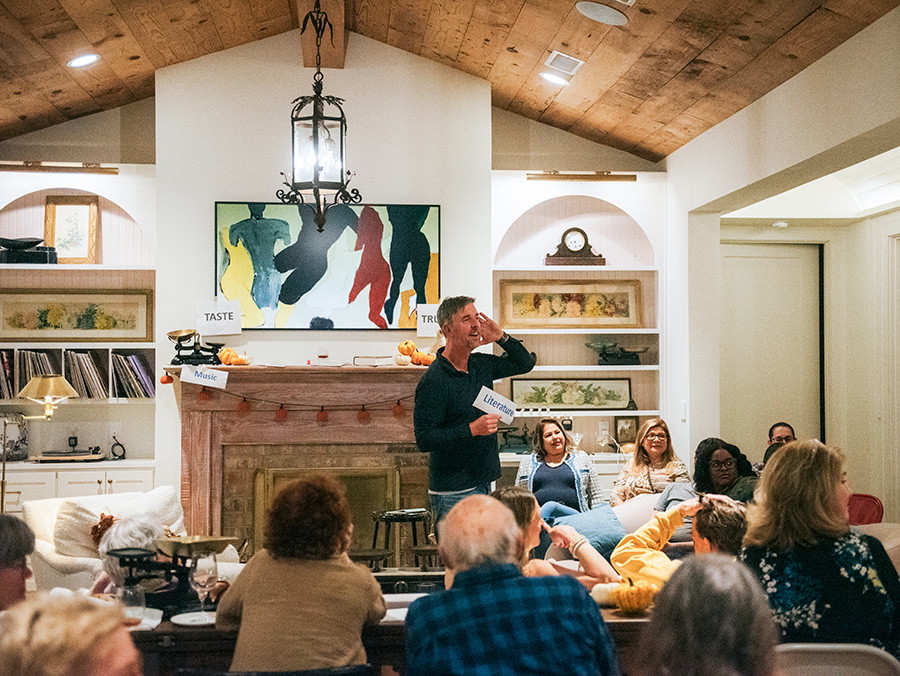Thinking Out Loud
Two alumni host intellectual discussions that call back to their college days.
Photography by: Shaina Sheaff
January 13, 2025
More than 50 people have packed into Kevin Roden's ('98) home, filling the open-plan living room, dining room and kitchen on a November evening.
Roden takes his place in front of the fireplace to start the monthly Drink and Think.
Tonight's discussion, just a week after the U.S. Presidential election: "Will we ever be able to talk politics at cocktail parties again? "
"For whatever reason," he says, "this is a topic of interest."
The audience bursts out laughing.

Kevin Roden (’98) leads the Drink and Think session in November.
Roden, vice president of partner success for the Teaching Strategies educational company, has hosted these monthly Drink and Think gatherings for more than 20 years, and organized similar versions while he was a student.
The events, which also are organized by Roden's longtime friend Brian Daskam ('02), have focused on intellectual topics as a way to build community. It gives participants an opportunity to engage with others who have different points of view in a laid-back setting.
"Maybe they handed you a napkin five minutes earlier and you had a good impression of them, "says Daskam, director of communications for faith-based nonprofit The Trinity Forum. "And so now you have to confront the fact that, 'I thought that they were evil in all these other ways, but he seemed kind of decent.'"
Understanding the Universe
"What I like to start out with is a toast," Roden says at the beginning of the November session. Then he quips, "Don't start breaking glasses."
Participants make different toasts before Roden asks what is the ideal way of talking about politics. They point out that social media, video games and the 24-hour news cycle have disrupted civil discussions.
The format is not that much different from when Roden, a native Ohioan who came to UNT for its music program before switching to political science, would buy pizzas and talk issues with friends as a student living in Bruce Hall.
Roden and Daskam, a journalism major, met in the late 1990s.
"We would have late-night intellectual conversations around whatever," Daskam says. "You want to understand how the universe works. You feel like the answers to those questions are available to you if you ask them."
After graduation, Roden worked as the assistant director of student life in the Texas Academy of Mathematics and Science program at UNT and Daskam served in several communications positions for the city of Denton. They lived in nearby apartments, and they would get together to read Plato's Republic and other philosophy books.
Drink and Think started in the early 2000s, when Roden was pursuing a Ph.D. at the University of Dallas.
"When you're in class, you're talking about all these great subjects," Roden says. "And I kept thinking, 'Man, you're talking with a bunch of other people trying to get Ph.D.s in this stuff.' But these are really interesting topics. What is love? What is justice? What is beauty? What is art? All these sorts of big questions of human life. What does it mean to be human? And I thought it certainly has its place in academia, but I think these original questions are meant to be addressed by everybody. So, I got the idea of, 'Why don't I just get some of my friends that might be interested in talking, and let's just center each night around a particular question?' I think the first one I did was, 'What is art?' And folks just crowded into my little apartment on Fry Street and opened up my refrigerator full of beer."
About 20 people showed up. More people came as word of mouth spread. Occasionally, there would be two people debating on a selected topic. Sometimes, the discussions focused on the offbeat, such as whether coffee or alcohol was more beneficial to society.
Daskam moved to Washington for a few years, but found he couldn't replicate the same kind of community in the Pacific Northwest, so he came back to Denton.
Making Connections
Later in the evening of November's discussion, Roden performs an exercise. He places pieces of paper with the words "taste" and "truth" on opposite ends of the mantle.
Then he mentions a topic and the audience has to pinpoint where it goes. For "science" and "math," the majority choose "truth."
But for the next few topics, they are divided. And they get noisy.
"Music" goes to "taste." The crowd makes a collective "oooh" on "literature," as they split down the middle. "History," "morals" and "education" go to the middle of the mantel, while "religion," "art" and "politics" are put under "taste."
"It can get raucous at times," Roden says. "And I certainly don't shy away from controversial topics. I'm trying to demonstrate how we discuss hard things with one another. And that's part and parcel to what I see as a necessary connection between the drink and the think."
And they're keeping a bit of college life alive.
"When people ask, 'What do you do?,' You can give a title that, 'I'm a director of X' or whatever, " Daskam says. "There was a desire to not lose, as part of my identity, someone who was thoughtful and was continuing to interrogate those questions about life. And, 20 years later, I'm not satisfied to leave those as dorm room conversations."